Producer, musician extraordinaire and a songwriter with a genuine artistic vision, LA-based Jonathan Wilson really is one of a kind
As the producer of both of Father John Misty’s critically acclaimed albums (as well as records for Conor Oberst, Roy Harper and others) and an integral member of Roger Waters’ touring behemoth, Jonathan Wilson has left an important mark in recent years. But even those achievements can’t overshadow his contributions as an artist in his own right.
With 2011’s Gentle Spirit and 2013’s Fanfare, he drew inspiration from his Laurel Canyon home to create a pair of psych-folk classics, with David Crosby, Graham Nash and Jackson Browne dropping by to lend a hand on the latter.
His latest album Rare Birds is a change in direction from those 70s-sounding early records. Instead, there’s a distinct 80s vibe, with Wilson utilising his mastery of the studio to create a multi-layered and dynamic album which will no doubt be very high on many end-of-year lists. It’s the kind of album George Harrison and Trevor Horn might have come up with had they ever had the chance to work together.
Shortly before the album’s release, we caught up with Jonathan to discuss his meticulous approach to songcraft…
How much of a complete picture of the end result did you have in mind when you started working on Rare Birds?
“The approach on this one was to record more than enough songs and be able to shape it into the perfect sequence. We ended up with 13 songs but I recorded 22 and my process was to finish them all to see where they all could go, some of them then didn’t make the cut and got canned. I have to bring the songs up to a certain point to be able to tell what I have and that’s pretty much the way I’ve done them in the past too.
“There’s never been a specific concept where I’m going to start with this song and go from there, it’s all been just songs that I’ve had. I started writing this album as far back as 2013. Basically I’ve waited patiently for the right songs.”
Is that made harder because of all the other things that you do or do you like giving yourself lots of simultaneous projects? Does that aid creation or get in the way?
“It doesn’t get in the way of the creative process, it does get in the way of my schedule but that’s okay. The nature of the other projects is that they’re things that I have to do. But that being said it’s great actually because all the other projects that I do those people they end up being my guinea pigs for my own shit. I’m getting paid to experiment and try techniques that I will then use on my own stuff.”
Do you have any specific examples?
“Just drum sounds and ways to record a 12-string and ways to record grand pianos. Loads and loads of experimenting that I get to do when it’s not attached to my name. That gives you a greater freedom. The drum sounds tend to be the biggest thing because that tends to define the album. Very specific techniques and very specific drums and microphones and preamps and different chains and different cymbals and different things that we use for different sounds.
“I probably wouldn’t have been able to find all those things if I didn’t spend month after month in the studio. The difference is that most people would go into the studio once every 24 months or 36 months and they would spend their 3 weeks in there and then they would be gone and they wouldn’t really know what they just did. But me on the other hand, I’m in there all the fucking time.”
Did playing with Roger Waters also bleed into your writing?
“Yeah, it definitely is a factor. For example some of the songs that are on the album, I played for him and got production advice on bits and bobs. Listen to the begin of the first track, Trafalgar Square, that has a little shade of Pink Floyd because a lot of that song was done at the same time that Roger was in my studio. So those guys would go home for the night and sometimes the same guitars were still set up and the same pedal sounds and stuff that we used. I would definitely trade back and forth from his project to mine.
“I put that bit first because it just feels like an intro. It’s just a natural build into something. Why I wrote a song about Trafalgar Square I have no fucking idea, I have no clue.”
But that’s not the only reference to places in England on the album. Was that a deliberate thing?
“It just sort of happened that way and I just let it happen. There are some tips of the hat to The Beatles and Kinks and Bonzo Dog Band and things like that, which I dig a lot. I just have a lot of British friends. I’m with British people all the time and I’m signed with a British outfit [Bella Union].”
How does one of your songs tend to start? Is it you and an acoustic guitar?
“Not as much this album, most of it was coming from the piano to start. About three years ago I was fortunate enough to purchase a beautiful Steinway which sits in my studio. I sit at that all the time so a lot of the songs came from the piano, which I think is part of the difference between this album and things from the past. Definitely Gentle Spirit was pretty much guitar-based. I tend to start with the chords and the melodies and I sort of wait for words to happen. Usually, that’s the process.”
Do you enjoy that next bit, piecing together all the layers to make a complete song?
“Yeah, that’s my favourite part and my speciality. I create a complex set of problems for myself – to edit out things and what’s stuck and why was I inspired to put that bit here and this bit there. To pursue each thing to fruition, that’s what I do. I think the better you get at what you’re doing the better you get at self-editing. At this point, from the production side, you learn to trust your gut and be like, ‘No that’s not gonna work.’
“It might be a string section that you paid a bunch of money for and you’re really desperate to work or you brought somebody in to play the saxophone, things you’re really excited about but at the end of the day that’s probably not something that should stick around in the song. That’s a skill that definitely gets much sharper.”
In that case, are you also good at knowing when a song is completed?
“For sure. I can sit there and work it all out. Especially in the mixing process, being the final stage where you do the final tweaks. I had the luxury on this particular album of being a person that owns an amazing studio, so I can take my time and, most importantly, take some time away from the music. Especially when you’re talking about that ‘maximalist’ sound with many, many, things going on.
“Each time you sit down and take a break from it and come back to it, you’re totally fresh. That explains why there’s been such a large gap since the last one. This album took around 18 months to make. A lot of time.”
You mentioned lyrics earlier. Will you have taken notes previously or do they pour out of you in the studio?
“It’s gathering for many, many months and many, many years – a first verse, second verse here. Maybe I can come up with something or finish something. I have to be completely by myself by the piano for many hours, figuring it out. Especially this album. On the songs where I’m actually saying stuff, each thing is extremely laboured over and meticulously edited. What you hear has been extensively planned.
“There’s nothing on there that’s like, ‘Oh, I’ll just regurgitate something for the third verse,’ or, ‘My oh my, look at the sky, I’m so high.’ That’s never going to happen. But that being said, I try to balance some of that with some fun and funky psychedelia stuff that’s basically not a continuation of some white guy and his precious feelings.”
As well as overarching themes of hope and regret there seems to also be a personal narrative about the end of a relationship too…
“Right, that’s in there. That’s contained within the album, that type of life experience and there’s definitely some sadness that you find in those particular tracks because that’s what was happening with me. But that’s not the point of the whole thing. I’m trying to mirror life experience from front to back. There’s a bit of sadness, there’s a bit of partying, there’s lots and lots of positive affirmation too.”
Do you find it easier to write about the personal or the more abstract topics?
“Well, none of it really comes easily to me. It’s like I’m like, ‘I just wrote this song and I’m so happy about it.’ I agonise through every bit of the process to get something that I dig. Regardless of the subject matter. But I would say that the positive and uplifting would probably come a little faster, so that could be viewed as being easier.”
When you sit down to write a song what do you hope to achieve?
“The only thing you can hope to achieve is just to truly be yourself and to have written something that was your voice, because that’s the only chance you have basically to spread and to be able last. It took me a really long time to figure that out, like the Miles Davis quote, ‘You have to play a long time to play like yourself.’
“Your only hope for resonating for many years to come is to figure out how to write something that is truly from your perspective and your sound and your voice, not putting on an affectation of what you think the current sound should be. I feel like I’ve done that, I can tell from travelling around the world and I see what songs I’ve written that have stuck with people and I think that they’ll continue to do that.”
For this album Loving You seems like a very good example of that. Although it’s in the middle of the album it sets the tone. How did that song and the collaboration with Laraaji come about?
“That was really cool because that was the first song that we did and that kind of started the album. I was planning on starting Rare Birds and I’d set aside 90 days in the summer of 2016 and I had the time booked out at my studio but I wasn’t sure what I was going to do to start it or how it was going to go. Was it going to be more of a band thing or something totally done by myself? So Laraaji came to town, he came to my studio and we did some stuff on the first day, some of his stuff.
“The second I was like, ‘I’ve got this thing, I’ve got this song that might be something for us to try.’ So I put down a little drum beat and a piano and vocal and then he came behind that and did exactly what you hear, the chanting, and he played some sounds from his iPad and that turned out to be the signature song that started the process.
“Then I did that same treatment to some of the other songs and it was just sort of like this celestial sound meets the 80s. I did Over The Midnight as a sort of sister song, so I did the same treatment on the drums and the cymbals and piano and stuff.”
When you’re waiting for an album to be released have you already put it to the back of your mind ready for the next project?
“Well not really. We’ve been preparing deeply for the release as far as we have seven videos ready to go, lots of touring and shows that are coming. I don’t have a day off until Christmas. On the breaks from the Roger tour is my own tour and that’s the vibe and it’s going to be that way for 2018, 2019 and 2020. Super busy.”
Do you enjoy taking your songs on the road?
“Most definitely and the shows that we’ve done with these songs have definitely been my best I’ve ever done. It’s a fantastic band, it’s not the giant stadium that I’m doing with the other tour but it’s my songs which is exciting.”
Lastly, any most cherished memory from writing and recording Rare Birds?
“Yeah man, one of them was the mastering process which was super cool. I used this really famous spot in Portland, Maine and this guy Bob Ludwig who has done things from Springsteen to Steely Dan and Journey, millions of things. I left the Roger tour in Boston and rented a car and drove up to Portland and did the mastering there and got to hear the album for the last time on their big Eggleston speakers.
“So that really stuck in my head, that final process. That’s where we add some top end here, take some bottom end off there, do this and that, little tiny bits to the songs. So finishing a project and then driving to Portland, Maine has become something that I’ve done. We did the same thing with Father John.
“When you finish the mastering they give you a compact disc. So I got to drive back from that town to Boston just blasting the CD. I think I turned it up to full volume and that was a celebration. You’re talking about a project that took thousands of hours, there’s so much time involved in this album.”




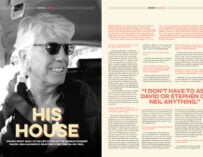
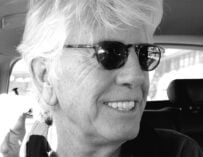
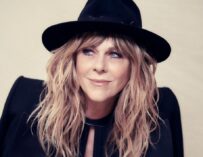


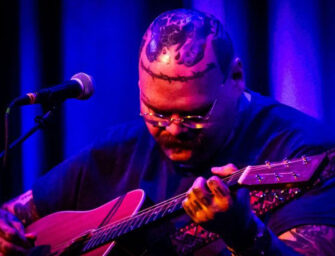
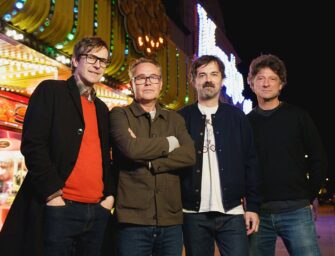

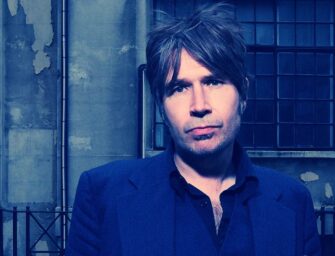























Related Articles